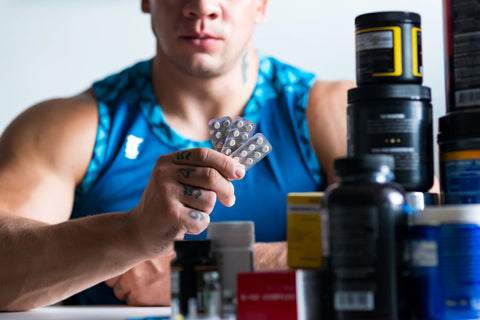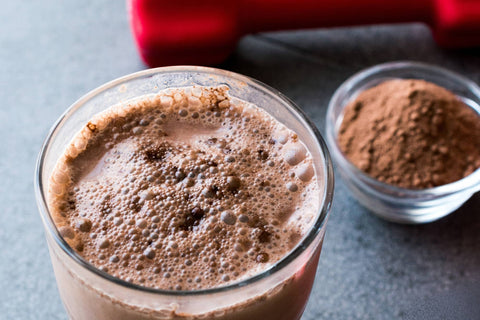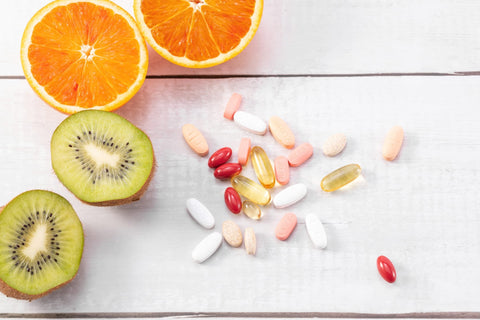Choosing the right vitamins to enhance your fitness can be as tough as the workout itself. With so many options in the market, it's easy to feel overwhelmed. But don't worry—this guide is here to help you navigate the choices.
Whether you aim to build muscle, increase endurance, or boost your overall health, we'll show you how to pick the supplements that work for you. Let's take the guesswork out of your fitness routine and find the perfect vitamins to complement your fitness goals.
Consider your Fitness and Health Goals
When setting your fitness goals, it's important to consider what your body needs to perform and recover efficiently.
For example, to build muscle, you should focus on nutrients that help with muscle repair and growth. For endurance training, look for supplements that boost energy levels and improve oxygen utilisation.
Those targeting weight loss should prioritise elements that enhance metabolism. And if your goal is overall wellness, choosing a mix of nutrients that support various body functions is key. Understanding these demands will guide you in selecting the right supplements to align with your fitness objectives.
Review the Gaps in Your Diet
Next, take a look at your diet. Is your daily intake providing all the necessary nutrients? Remember, even the most balanced eating habits can have deficiencies.
Plus, certain nutrients are commonly low in our regular diet. This includes omega-3 fatty acids, fiber, and iron. Consider how these gaps could be affecting your fitness and overall health. For example, insufficient iron can lead to fatigue and affect your endurance, while a lack of omega-3 in the diet can cause joint pain.
Understand the Role of Each Vitamin and Mineral for Fitness
Each nutrient we consume contributes uniquely to our health, body, and fitness. Before supplementing your diet with any vitamin or mineral, make sure to understand their function.
Vitamin D
Vitamin D helps absorb calcium and phosphorus - the two minerals necessary for maintaining bone strength and density. Moreover, Vitamin D plays a role in immune function and inflammation reduction, which can be particularly beneficial in recovery and muscle repair after strenuous workouts.
Studies also show that lacking Vitamin D can impair muscle recovery post-exercise.
Sources of Vitamin D
- Sunlight exposure (the body manufactures Vitamin D upon exposure to UV rays)
- Fatty fish like salmon, mackerel, and tuna
- Fish liver oils
- Fortified foods such as milk, cereal, and orange juice
- Egg yolks
Magnesium
Magnesium supports more than 300 essential body functions, many of which involve converting food into energy. This makes it vital for energy metabolism, particularly when an individual is physically active.
Magnesium helps control how your muscles contract and relax. This can help prevent muscle cramps during and after intense workouts. It also plays a role in creating DNA and RNA. These are building blocks of your cells that aid in the repair and growth of muscle tissues.
Sources of Magnesium
- Nuts and seeds (almonds, cashews, peanuts, pumpkin seeds)
- Leafy green vegetables (spinach, kale, Swiss chard)
- Whole grains (brown rice, oatmeal, whole wheat bread)
- Legumes (black beans, chickpeas, lentils)
- Fish (mackerel, salmon, halibut)
- Bananas
- Dark chocolate
- Avocados
Iron
Iron helps form haemoglobin, which transports oxygen to muscle tissues. This can enhance workout stamina and performance.
An iron deficiency can lead to anaemia, which can cause fatigue and reduced endurance. Athletes, especially women, must monitor their iron levels to maintain peak performance.
Sources of Iron
- Red meat (beef, lamb, venison)
- Poultry (chicken, turkey)
- Fish (tuna, salmon, halibut)
- Legumes (lentils, chickpeas, beans)
- Leafy green vegetables (spinach, kale)
- Iron-fortified cereals and breads
- Dried fruits (apricots, raisins, prunes)
Calcium
We all know that calcium helps maintain optimal bone health. It is also necessary for proper muscle contractions and nerve signalling. It helps release neurotransmitters from neurons and the regulation of muscle contraction.
If calcium levels are too low, it might lead to muscle cramps and discomfort during exercise. In addition, adequate calcium intake prevents stress fractures and maintains athletes' strong skeletal structures.
Sources of Calcium
- Dairy products (milk, cheese, yoghourt)
- Leafy green vegetables (broccoli, kale, collard greens)
- Fortified plant-based milks (almond, soy, oat milk)
- Tofu (calcium-set)
- Canned fish with bones (sardines, salmon)
- Fortified cereals and juices
- Almonds
- Figs
B Vitamins (B6, B12, Folate, Thiamine, Riboflavin)
B Vitamins play a key role in energy metabolism. Vitamins like B1 (Thiamine), B2 (Riboflavin), B6, and B12 help convert dietary energy into ATP (adenosine triphosphate), the fuel that powers muscle contractions. Additionally, these vitamins help repair muscle tissues and enhance recovery after intense workouts.
A B Vitamin deficiency can lead to reduced energy levels, muscle weakness, and impaired performance. In severe cases, it can also cause anaemia (particularly from lacking B12 or folate), impacting endurance and overall fitness.
Sources of B Vitamin
- Whole grains (brown rice, barley, millet)
- Meat (red meat, poultry, fish)
- Eggs and dairy products (milk, cheese, yogurt)
- Legumes (beans, lentils, chickpeas)
- Seeds and nuts (sunflower seeds, almonds, walnuts)
- Dark leafy greens (spinach, Swiss chard)
- Fruits (citrus fruits, bananas, avocados)
- Fortified foods (cereals, nutritional yeasts)
Vitamin C
Vitamin C is a powerful antioxidant that helps protect the body against oxidative stress during intense physical activity. It is also necessary for tissue repair, collagen production (which is important for joint and skin health), and iron absorption.
Regular Vitamin C intake can enhance the immune system, helping athletes stay healthy and recover faster from training. Its role in collagen synthesis also makes it vital for maintaining the structural integrity of muscles and ligaments.
Sources of Vitamin C
- Citrus fruits (oranges, grapefruits, lemons, limes)
- Berries (strawberries, raspberries, blueberries, blackberries)
- Kiwi
- Bell peppers (red, yellow, and green)
- Tomatoes
- Broccoli
- Cauliflower
- Brussels sprouts
- Leafy greens (kale, spinach)
- Papaya
- Mangoes
Zinc
Zinc is a mineral that impacts athletic performance and overall physical health. It plays a key role in protein synthesis, wound healing, and immune function, all of which are important for fitness enthusiasts. It also helps in hormone production, including testosterone, which can influence muscle growth and repair.
Adequate zinc levels support immunity and help maintain intense fitness regimens. A lack of this mineral can impact physical performance, reduce muscle strength, and slow recovery times.
Sources of Zinc
- Meat (beef, lamb, pork)
- Shellfish (oysters, shrimp, crabs)
- Legumes (chickpeas, lentils, beans)
- Nuts and seeds (pumpkin seeds, cashews, almonds)
- Dairy products (milk, cheese, yoghourt)
- Eggs
- Whole grains (wheat, quinoa, rice)
- Dark chocolate
Including Nutrients in Your Diet and Lifestyle
Even if you are extra cautious with your diet, ensuring you get all the essential nutrients needed for optimal fitness can be challenging. Here are some tips to add the essential vitamins and minerals to your daily diet:
- Include a variety of fruits, vegetables, proteins, and whole grains.
- Align nutrient intake with your body’s needs, such as combining iron-rich foods with vitamin C for better absorption.
- Choose cooking methods like steaming or grilling to preserve nutrients.
- Select supplements based on specific deficiencies or fitness goals, and read labels to avoid excessive doses.
- Observe how changes in diet and supplementation affect your body and adjust as necessary.
- Support your nutritional efforts with adequate sleep, stress management, and hydration.
How to Choose the Right Vitamin Supplement
If you cannot make the most of your workout routine despite being careful with your diet, it may be ideal for you to use a vitamin supplement. However, it’s advised not to start taking any supplements without thoroughly understanding your body's needs.
Here’s a guide on how to choose the right vitamin supplement to maximise your fitness results and ensure overall well-being:
- Evaluate Your Diet: Before adding supplements, analyse your diet to identify any nutritional gaps. This can help pinpoint which vitamins or minerals you need to supplement.
- Consult a Healthcare Professional: It’s crucial to consult with a doctor or dietitian before starting any new supplement. They can offer guidance based on your health history, current diet, and fitness goals.
- Consider Your Fitness Goals: Different supplements can help support different fitness objectives. You might consider protein supplements and creatine for muscle gain, while endurance athletes might focus on iron and B vitamins.
- Look for Trusted Brands: Choose supplements from reputable brands that adhere to good manufacturing practices and are certified by third-party organisations like USP or NSF.
- Check for Allergens and Additives: Read labels carefully to ensure the supplements do not contain allergens or unnecessary additives you may wish to avoid.
- Monitor Your Progress: Once you start taking a supplement, monitor any changes in your health and fitness levels. This can help determine if the supplement is effective and if you need to adjust the dosage.
Potential Risk of Supplementing with Vitamins
While vitamin supplements can be beneficial, they also carry potential risks, especially when not used appropriately. Over-supplementation can lead to toxicity and interact negatively with other medications. It’s important to approach vitamin supplementation with caution and informed guidance.
If you take any vitamins, remember that there is always a risk of vitamin overdose. Some dangers of vitamin overdose include:
- Nausea and vomiting
- Diarrhoea
- Stomach cramps
- Liver damage
- Kidney damage
- Increased risk of bleeding
- Nerve damage
- Hair loss
- Skin rash
- Birth defects (if pregnant)
- In severe cases, vitamin overdose can be fatal
Some vitamins can also interfere with the effectiveness of prescription medications. For example, Vitamin K can reduce the efficacy of blood thinners, and high doses of Vitamin C may interact with chemotherapy drugs.
To prevent potential interactions between vitamins and prescription medications, consult your healthcare practitioner before starting any new supplements. They can offer guidance on safe supplement usage and adjust medication dosages if necessary.
Empower Your Fitness Journey with the Right Supplement by Fenix Active
Choosing the right vitamins and supplements is critical in supporting your fitness goals and overall well-being. While supplements can play a crucial role in filling nutritional gaps and enhancing performance, it's important to remember that they should not replace a balanced diet. Excessive reliance on supplements can lead to imbalances and health issues. Always aim for a nutrient-rich diet and use supplements as a secondary support system.
Before starting any new supplement regimen, it's wise to consult with a healthcare professional to tailor the choices to your specific needs and conditions. Remember, the goal is to complement your diet, not to compensate for poor eating habits.
Ready to enhance your fitness journey with high-quality supplements? Explore Fenix Active and our range of vitamins to support a healthy, active lifestyle. Shop today and find the perfect complement to your fitness routine!



